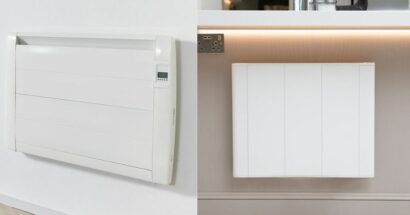No products in the basket.
Are you torn between electric radiators or gas central heating for your home? Are electric radiators cheaper than gas in the long run? Considering replacing gas central heating with electric radiators? These are common dilemmas for UK homeowners seeking an ideal heating solution.
The debate between these two heating systems is age-old, each with its merits and drawbacks. Cost is a paramount concern. You’ll ponder over installation, running expenses, and maintenance fees.
Efficiency matters too—how can you heat your home effectively while minimising energy waste? And, in our environmentally conscious era, the environmental impact looms large.
In a world striving to reduce carbon footprints, your heating choices matter.
If you’re in the market for a kitchen heating solution—whether renovating, building, or simply intrigued by the differences—our comprehensive guide has you covered.
So, if you’re eager to explore the realms of electric radiators vs gas central heating, read on. We promise you’ll find it enlightening.
Comparing Energy Costs: Electric Radiators vs Gas Central Heating
When picking the right heating system for your kitchen, it’s essential to grasp the cost differences between electric radiators and gas central heating. In the UK, where winters can be cold, and energy bills are a concern, making the smart choice can save you money.
Energy Costs
Electric Radiators
Electric radiators cost a bit more to run. This is mainly because electricity is pricier than gas. However, the upfront cost of getting electric radiators installed is often lower. Over time, this initial saving can help offset the higher running costs.
Gas Central Heating
Gas heating tends to be cheaper in the long run. Gas is generally cheaper than electricity. While the setup cost for a gas central heating system can be higher, you’ll likely pay less to keep it running.
Tariff Matters
Electric Radiators
Energy tariffs greatly affect how much you pay to run electric radiators. The type of tariff you’re using, whether a standard variable rate or a fixed-rate plan, can significantly affect your monthly expenses. Considering off-peak electricity tariffs is a good idea, which can result in significant savings.
Gas Central Heating
Gas tariffs are usually more stable, but your choice of tariff can still make a difference. It’s worth exploring different gas providers and tariff options to find the most cost-effective one for how you use your heating.
Usage Patterns
Electric Radiators
How you use heating with electric radiators is vital. Using them sparingly during off-peak hours can significantly reduce costs.Modern electric radiators often include programmable features, allowing you to heat rooms only when necessary.
Our electric radiators feature an Intelligent Control System that accurately monitors and adjusts your room temperature. In simpler terms, they lower their heat output as soon as your room reaches the desired temperature.
This typically happens within minutes of turning them on, resulting in significantly lower running costs than traditional central heating.
Gas Central Heating
Gas central heating systems are typically designed for continuous use. Frequently turning them on and off can be less efficient. It’s essential to balance maintaining a comfortable temperature and minimising energy consumption.
Room Insulation
Electric Radiators
The quality of insulation in your rooms plays a significant role when using electric radiators. Good insulation traps heat within your living spaces, preventing it from escaping through walls, windows, and roofs.
This means that the heat generated by your electric radiators stays put, reducing the need for constant heating. If your home isn’t well-insulated, it might be worth investing in insulation upgrades. This can make a notable difference in energy efficiency, keeping your home warm without excessive heating.
Gas Central Heating
Proper insulation is equally important for gas central heating. Well-insulated rooms can retain heat for longer periods, which eases the workload on the central heating system.
When rooms are well-insulated, the heat produced by the gas central heating system doesn’t dissipate quickly, allowing it to maintain a comfortable temperature with less frequent cycling. This translates to reduced energy consumption and, subsequently, lower heating costs.
| Aspect | Electric Radiators | Gas Central Heating |
| Cost | Slightly pricier to run due to electricity but lower setup cost. | Costs less to run thanks to cheaper gas but higher installation expense. |
| Tariff Impact | Sensitive to tariffs; consider off-peak electricity for savings. | Gas tariffs are stable; explore providers for cost-effectiveness. |
| Usage Efficiency | Use wisely during off-peak; programmable for precision. | Works well continuously; frequent on/off reduces efficiency. |
| Room Insulation | Thrive in insulated rooms; keep heat, and reduce constant use. | Benefit from insulation; maintains warmth, less energy needed. |
| Overall Efficiency | Efficient with insulation and smart use; targeted warmth. | Keeps comfort efficiently with insulation despite higher initial cost. |
Comparing Efficiency in Terms of System Losses
When evaluating heating systems, it’s crucial to grasp the concept of system losses because it directly impacts efficiency and cost-effectiveness.
System losses encompass the heat energy that escapes during the heating process, and several factors contribute to this phenomenon.
- Thermal Loss through Insulation: Inadequate home insulation can cause heat to leak through walls, windows, and the roof, resulting in substantial energy losses.
- Transmission Loss: Heat transfer from the source to the living areas can lead to losses in the system. This occurs as heat moves through pipes, ducts, or conduits.
- Distribution Loss: In central heating systems like gas central heating, heat can be lost as it travels through a network of pipes and radiators. This is particularly relevant in larger properties.
- Startup and Shutdown Loss: Some heating systems experience losses during the startup and shutdown phases. These losses can be minimised with efficient control systems.
- Inefficient Heating Elements: Heating elements, such as radiators or heaters, can contribute to system losses if they are not designed or maintained for optimal efficiency.
- Thermostat and Control Settings: Improperly configured thermostats and control settings can lead to inefficient heating.
Electric Radiator Running Costs
When considering the choice between electric radiators and gas central heating, one crucial aspect is their running costs. Let’s delve into the typical running costs associated with electric radiators and answer the burning question: How much does an electric radiator cost to run?
Type of Radiator
The choice of an electric radiator can significantly impact running costs. Modern, energy-efficient models are designed to provide better heat retention and distribution, reducing energy consumption.
Wattage
The wattage of your electric radiators plays a crucial role in determining running costs. Higher-wattage radiators can heat a room faster but may consume more electricity.
Choosing the right wattage for your room size is important for cost-effectiveness.
If you’re unsure about the ideal wattage for your space, you can use our radiator calculator to help you make an informed decision.
On the type of standard energy tariff we’ve chosen above, a 500W electric radiator will typically cost about 5 pence per hour to run. Already then, it’s pretty close to the cost of gas central heating.
Usage Patterns
How you use your electric radiators matters. Running them continuously at a high temperature can result in higher costs. Utilising programmable features to heat rooms only when needed can lead to substantial savings.
Insulation
The quality of insulation in your home influences running costs. Well-insulated spaces retain heat better, reducing the need for constant heating and lowering your overall electric bill.
Energy Tariffs
The type of energy tariff you’re on can affect running costs. Off-peak electricity tariffs may offer reduced rates during non-peak hours, making it more economical to run your electric radiators at specific times.
| Factor | Description | Impact on Costs | Key Considerations |
| Type of Radiator | Energy-efficient models reduce consumption, affecting costs. | Moderate | ModelEfficiency Ratings |
| Wattage | Proper wattage choice matters; higher wattage may increase usage costs. | High | Room SizeRadiator Specs |
| Usage Patterns | Efficient use and scheduling can lead to substantial savings. | High | Heating HabitsSchedules |
| Insulation | Good insulation reduces the need for constant heating, lowering bills. | High | Home Insulation Quality |
| Energy Tariffs | Tariff type influences costs; off-peak tariffs can offer savings. | Moderate | Tariff SelectionUsage Timing |
Considering these factors, you can make informed decisions regarding your electric radiators vs gas central heating and optimise their running costs.
Comparison of Heating Programming
When it comes to electric radiators vs gas central heating, understanding their heating programming capabilities is essential. Let’s compare the two systems and delve into the benefits of smart thermostats for both.
Electric Radiators
Electric radiators provide precise temperature control for individual rooms and offer programmable features that allow you to set specific temperatures at different times. This level of flexibility is perfect for tailoring your heating to match your daily routine.
For example, you can program them to warm up bedrooms at night and living areas during the day. This ensures comfort and helps you save energy by heating rooms only when needed.
One notable advantage of electric radiators is their ability to create heating zones throughout your home, granting you precise control over each room’s temperature. This is especially beneficial in larger households or homes with varying heating needs.
Gas Central Heating
Gas central heating systems offer programmability, but typically on a broader scale. You can set a central thermostat to control the temperature for the entire house. While some advanced systems may allow for zoning to manage specific areas separately, it could be more granular than what electric radiators can achieve.
| Aspect | Electric Radiators | Gas Central Heating |
| Temperature Control | Precise control for individual rooms. | Central thermostat for the whole house. |
| Programmable Features | Allows setting specific temperatures at various times. | Programmable but typically broader in scale. |
| Daily Routine Flexibility | Ideal for tailoring heating to match daily routine. | It may require broader adjustments. |
| Energy Efficiency | Helps save energy by heating rooms only when needed. | Efficiency can vary based on usage. |
| Zoning Capability | Can create heating zones for precise room-by-room control. | Zoning may be possible but less granular. |
Maintenance: Electric Radiators vs Gas Central Heating
Maintaining your heating system is essential to keep it running smoothly. Let’s compare the maintenance requirements of electric radiators and gas central heating systems, discuss their typical lifespan, and discuss potential issues you might encounter.
Electric Radiators
Electric radiators are straightforward to maintain and require minimal attention. Keeping them clean and ensuring they are properly connected is usually sufficient. Regularly removing dust and dirt ensures they function efficiently.
Gas Central Heating
Gas central heating systems are more complex and demand a yearly checkup by a professional to ensure everything is in good working order.
This annual maintenance includes thoroughly inspecting and cleaning the boiler, checking for potential gas leaks, and ensuring overall safety. Additionally, central heating systems may contain more components like pumps and controls that require periodic examination.
| Aspect | Electric Radiators | Gas Central Heating |
| Maintenance Effort | Minimal effort, mostly cleaning | Requires professional annual check-up |
| Cleaning | Regular dust and dirt removal | Boiler and system cleaning, more extensive |
| Professional Inspection | Not typically needed | Yearly inspection essential |
| Safety Check | Basic safety checks | Comprehensive safety checks, including gas leak detection |
| Lifespan | Typically durable | Durable with proper maintenance |
| Complexity | Straightforward and simple | More complex system with multiple components |
| Maintenance Cost | Lower maintenance costs | Higher maintenance costs |
Depreciation: Lifespan and Value
Understanding how heating systems depreciate over time and their typical lifespan is essential for informed decision-making.
Let’s explore how electric radiators and gas central heating systems depreciate and how long they typically remain operational.
Electric Radiators
Electric radiators tend to hold their value well over time. They are robust and straightforward, which contributes to their durability. However, like any technology, their value may decrease as more efficient models become available.
Gas Central Heating
Gas central heating systems can experience a faster depreciation due to their more intricate components, such as the boiler. Nonetheless, you can extend their operational lifespan with regular maintenance and care.
Having insights into the expected lifespan and depreciation of heating systems can guide you in making the right choice, whether you’re considering transitioning from gas central heating to electric radiators or deciding between the two options.
| Aspect | Electric Radiators | Gas Central Heating |
| Depreciation Rate | Slow | Faster due to complex parts |
| Lifespan | Long-lasting | With maintenance, extended |
| Value Retention | Holds value reasonably well | May depreciate more quickly |
| Maintenance Requirements | Minimal maintenance needed | Yearly checkup recommended |
| Potential Efficiency Upgrades | Upgradable with new models | Limited upgrades available |
Installation Costs: Electric Radiators vs Gas Central Heating
Knowing how much it costs to set up your heating system is essential when planning. Let’s compare how expensive it is to install electric radiators and gas central heating and see if there’s any help available.
The average cost to install central heating from scratch in a 3-bed home is around £3,235–£4,200.
Electric Radiator
Setting up is usually less expensive. They’re simple to install and often only need a few changes to your place. This simplicity can save you money, which is great if you want a budget-friendly heating choice.
Our popular 500W slimline radiators cost £199 each and are so easy to install that you can do it yourself. All you need is a plug socket nearby and some basic DIY in fitting the brackets to the wall. A rough estimate of 8 radiators needed (3 bedrooms, 1 bathroom, living room, dining room, hall and kitchen) would cost £1600.
Gas Central Heating
Setting up gas central heating can cost more upfront. It involves putting in gas pipes, a boiler, radiators, etc. It might seem costly initially, but it can save money on running costs in the long run.
Even if you hire a tradesperson to help fit the radiators, an average day rate of £200 (used in the gas central heating quote above) leaves electric heating much cheaper to install.
| Aspect | Electric Radiators | Gas Central Heating |
| Installation Costs | Less expensive, simple setup. | Higher upfront costs due to gas pipes, boiler, and radiators. |
| Grants and Assistance | Grants are available for energy-efficient electric heating. | Programs exist for financial help with energy-efficient gas central heating. |
With extremely low installation costs and no plumbing work required, electric radiators are the modern heating solution of choice for extensions, loft conversions and anyone renovating a house where the old central heating system needs an overhaul.
When deciding between electric radiators and gas central heating, consider how much it costs to install them and if any help is available. This can help you choose what’s right for your budget and how you want to heat your place.
Which Is Better For The Environment – Electric Or Gas Heating?
When evaluating the environmental impact of heating choices, it’s crucial to consider the source of electricity. Our electric radiators have a proven track record of eco-friendliness, especially when powered by renewable energy sources like wind or solar.
Electric Radiators
The environmental impact of electric radiators depends on the source of the electricity they use. When powered by renewable energy sources like wind, solar, or hydroelectric power, they are eco-friendly. However, if the electricity comes from fossil fuels such as coal or gas, it can contribute to pollution.
Gas Central Heating
Gas central heating systems emit pollutants like carbon dioxide when burning natural gas. This typically results in a larger carbon footprint than electric radiators, especially in regions adopting cleaner energy sources.
| Aspect | Electric Radiators | Gas Central Heating |
| Carbon Footprint | Environmentally friendly with renewable energy sources; less so with fossil fuels. | Generates carbon emissions when burning natural gas. |
| Embracing Sustainability | Benefits from cleaner energy sources; increasingly greener. | Improved energy efficiency, new technology, and better insulation contribute to reduced energy use. |
Gas vs. Electric Boilers?
Comparing gas boilers to electric boilers involves evaluating their efficiency, costs, and advantages while considering various scenarios where one might be a better choice.
Gas Boilers
Gas boilers are known for their high efficiency and cost-effectiveness, especially when natural gas prices are reasonable. They can provide consistent and reliable heating for large spaces efficiently. However, they require access to a gas supply, which may only be available in some locations.
Electric Boilers
Electric boilers are generally less efficient and cost-effective than their gas counterparts, primarily due to the higher cost of electricity compared to gas.
They are suitable for smaller spaces and areas with limited gas availability. Electric boilers may be viable when renewable energy sources power them, reducing their environmental impact.
| Aspect | Gas Boilers | Electric Boilers |
| Efficiency | Highly efficient, especially with low gas prices. | Generally less efficient due to higher electricity costs. |
| Cost-Effectiveness | Cost-effective when natural gas is affordable. | Tends to be more costly due to electricity rates. |
| Suitable for | Larger spaces with access to gas supply. | Smaller spaces and areas with limited gas access. |
| Environmental Impact | Higher carbon footprint when powered by fossil fuels. | Potential for reduced impact when using renewable electricity. |
What About Heat Pumps and Hybrid Systems?
Let’s simplify the concept of heat pumps and hybrid systems and discuss their benefits, costs, and where they fit into the electric vs. gas debate.
Heat Pumps
- How They Work: Heat pumps are like magic heaters. They pull heat from the air or the ground and bring it inside your home to keep you warm in the winter.
- Benefits: Heat pumps are super-efficient and kind to the environment. They use less electricity than electric radiators, can cool your home in the summer, and work well in areas without gas.
- Costs: Heat pumps might cost more initially, but they save you money in the long run because they use less energy.
Hybrid Systems
- Hybrid Power: These systems are like having two superheroes. They use a heat pump most of the time, but when it gets cold, a gas boiler steps in to help.
- Benefits: Hybrid systems are flexible and adapt to changing weather. They’re a good choice if you want both efficiency and reliability.
- Costs: Hybrid systems can be pricier upfront since they have both a heat pump and a gas boiler. But they can save you money in the long run by using energy wisely.
Heat pumps and hybrid systems are important in the electric vs. gas debate. They offer efficient options, especially where there’s no gas. While the initial cost might make you think, remember the long-term benefits: lower bills and a kinder environmental impact.
Tips for Saving on Electric Heating
To lower your electric heating bills and make your home more energy-efficient, consider implementing these five simple tips for saving electric heating bills.
Optimise Thermostat Settings
Set your thermostat to a comfortable but not excessive temperature. Lower it when you’re not home or at night to reduce unnecessary heating costs.
Seal Drafts and Insulate
Keep the warm air inside by sealing gaps around windows and doors. Proper insulation in your home can significantly reduce heat loss and lower your bills.
Utilise Programmable Thermostats
Invest in a programmable thermostat to automate temperature adjustments based on your daily routine, ensuring you’re only heating rooms when needed.
Regular Maintenance
Keep your heating system in shape with regular checkups and cleaning. A well-maintained system is more efficient and can save you money in the long run.
Upgrade to Energy-Efficient Appliances
Consider replacing old and inefficient heating appliances with modern, energy-saving models. While there might be an initial cost, the energy savings will make it a wise investment in the long term.
Replacing Gas Central Heating with Electric Radiators
The choice between electric radiators and gas central heating hinges on cost, efficiency, and environmental impact. While electric radiators are often considered more cost-effective and eco-friendly, evaluating your specific circumstances is essential.
Transitioning from gas central heating to electric radiators can result in long-term savings and a reduced carbon footprint. This is especially true when combined with energy-efficient practices and considering the cost benefits of making this switch.









Leave a Reply